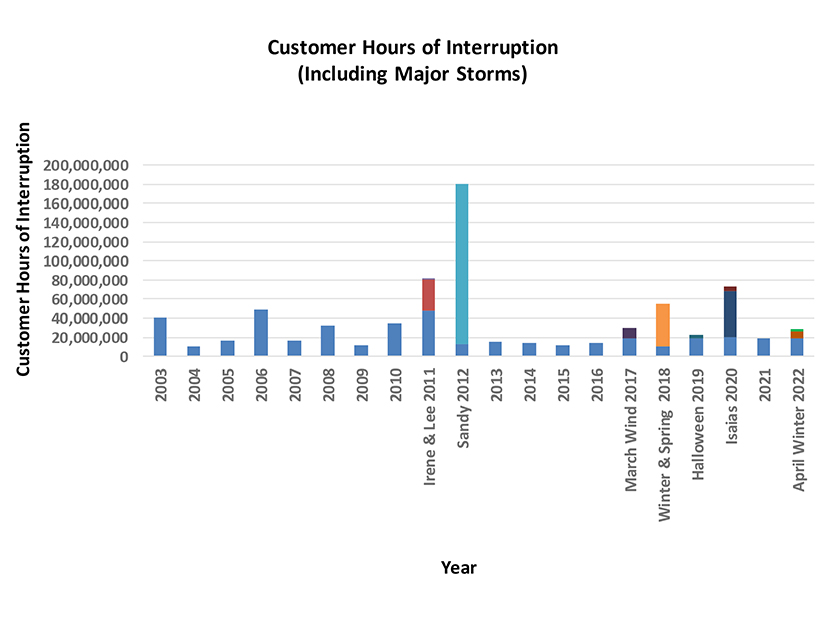New York’s electric utilities in 2022 showed improved service reliability over 2021 and over the average in the preceding five years. (Case 23-E-0119)
But in other areas, the New York State Public Service Commission found performance by electric and other utilities lacking in 2022. It is assessing a record $22.6 million in penalties against six utilities for failing to meet customer service metrics.
The penalties are one of the sticks in the carrot-and-stick assortment of utility performance incentives contained within the commission’s rate design, and it was a particularly big stick this time: The PSC said the penalties assessed Thursday were 10 times higher than those imposed for 2021 failures.
PSC Chair Rory Christian in a prepared statement said: “In 2022, almost a quarter of those utilities fell short of their legal requirements in certain areas. The Commission will aggressively work to ensure lagging utilities improve performance. Maintaining reliability and ensuring good customer service is required for utilities, and the Commission holds them accountable when they fail to meet our standards.”
Aside from New York State Electric & Gas — which garnered a $7 million revenue reduction for outage frequency — reliability was a bright spot for New York electric utilities in 2022.
Department of Public Service staff said the reliability of the state’s electric utilities is measured by two primary metrics: frequency and duration.
Excluding major storms, frequency was less in 2022 than in 2021 and less than the statewide five-year average. Duration, again excluding major storms, averaged 1.9 hours, 5.4 minutes shorter than 2021 and 4.8 minutes less than the five-year average.
There were 34 major storms in 2022, four fewer than the year before. But the impact of the 2022 storms was much greater than 2021’s storms, with 31% more customers affected and a 100% increase in duration of outage.
The majority of the 2022 increases can be attributed to just three winter storms.
During Thursday’s meeting, Christian called this a worrisome development, illustrating how impactful a single storm can be in an era where severe weather events are becoming more frequent.
Central Hudson, Con Edison, National Grid, Orange & Rockland and RG&E met all reliability targets in 2022. But NYSEG missed its frequency target for the fourth consecutive year.
DPS staff said tree contact continues to be the largest contributing factor in NYSEG’s outages, accounting for 42.1% in 2022, more than any other utility in the report.
The PSC expanded NYSEG’s vegetation management budget in the 2020 rate order; the utility has seen a decrease in outages due to trees within its rights of way since then but an increase in outages caused by trees outside the ROWs.
These “danger trees” outside the ROWs were specifically targeted in one of the programs funded in 2020.
Overall, 82,288 service interruptions affected 5,298,241 customers statewide for a combined total of 10,075,244 hours in 2022. The dataset covers the six regulated electric utilities and PSEG-LI.
On safety measures — stray voltage, gas leaks and other potential hazards — the DPS review found electric and gas utilities in full compliance and continuing a trend of improvement in most respects.
DPS staff in their review said most of the state’s utilities met or exceeded the customer service standards established in their rate case proceedings for metrics such as call answer rate, customer satisfaction survey and PSC complaint rate. The 2022 laggards, and their revenue penalties, are:
Central Hudson, $2.9 million; NYSEG, $8.72 million; RG&E, $5.9 million; Con Edison, $4 million; St. Lawrence Gas, $36,000; National Grid, $1.05 million.
The customer service reports issued Thursday are separate from ongoing DPS investigations into current and past billing problems at Central Hudson, NYSEG and RG&E. But the PSC said the reports could inform the billing investigations.
Also on the consumer protection front, the PSC on Thursday set rules and regulations governing energy brokers and consultants. (Case 23-M-106)
Christian said the move is designed to increase transparency in and oversight of a previously unregulated but rapidly growing area of the clean-energy economy in New York.
The new rules require persons, firms and associations acting as an energy broker or consultant to register annually with the PSC, pay a $500 registration fee, and demonstrate financial accountability. The deadline is Aug. 31, 2023.
The new rules also require disclosure of compensation paid to brokers and establish enforcement procedures.
Rebates from the broker/consultant to the ratepayer are banned, as they could obscure actual costs, and the PSC can order customer rebates to be drawn from a letter of credit that brokers/consultants will have to provide.




